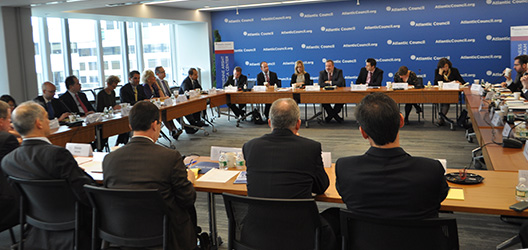 On May 22, the Adrienne Arsht Latin America Center, together with the Global Business and Economics Program, launched the Global Trade and the Americas initiative with a conversation focused on global trade negotiations and prospects for deepening US and European commercial engagement with Latin America at a private, off the record roundtable in the midst of World Trade Week.
On May 22, the Adrienne Arsht Latin America Center, together with the Global Business and Economics Program, launched the Global Trade and the Americas initiative with a conversation focused on global trade negotiations and prospects for deepening US and European commercial engagement with Latin America at a private, off the record roundtable in the midst of World Trade Week.
The roundtable was gathered to address the policy recommendations in a forthcoming Atlantic Council policy brief entitled “Global Trade Policy: Made in Latin America?” which will be released next week.
The discussion featured high-level representatives from the United States government, the Washington diplomatic corps, as well as leading thinkers from private industry. The conversation focused on the influential role that Latin America can and should play as the global trade agenda moves forward—and the consequences for the region and the world if Latin American countries fail to do so.
As negotiations towards the Trans-Pacific Partnership (TPP) and Transatlantic Trade and Investment Partnership (TTIP) move forward, there will be major ramifications for the trade, investment, and regulatory policies in all negotiating countries. Some, but not all, Latin American states are currently negotiating TPP. Moreover, TTIP involves the world’s two largest economies—the United States and the EU—both of which are major markets for all Latin American countries. Policymakers should therefore take immediate and credible steps to ensure that the opportunities provided by the two agreements help contribute to a broader level of international economic cooperation.
This is a pivotal moment for global trade. The United States, Europe and Asia are all major focal points for these ongoing negotiations, but Latin America is at the center of their convergence. The Global Trade and the Americas initiative hopes to inform the public debate on these issues in Washington and beyond as negotiations move forward.
